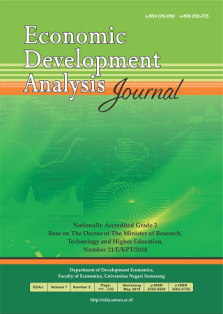Stunting In Java Island: Spatial and Risk Factor Analysis
Abstract
The prevalence of stunting is above 20%, indicating a significant health problem in Indonesia. This research aims to identify the predictors influencing stunting on the island of Java and to map its distribution using Geo Maps Orange data mining. Data analysis employs multiple linear regression methods with cross-sectional data. Secondary data was obtained from the Badan Pusat Statistik and the Nutrition Status Survey in 2022. The data was processed using Eviews 10 and Geo Maps Orange data mining. The results show that stunting is influenced by various variables. The Human Development Index (HDI) and proper sanitation have a significant negative influence on stunting. Based on mapping, Central Java Province has the highest incidence of stunting, while DKI Jakarta has the lowest incidence on the island of Java. Stakeholders can use this information to promote better parenting patterns, health hygiene practices, affection or compassion practices, and the implementation of clean water sanitation programs to create quality environmental conditions and mitigate the threat of infectious diseases, especially stunting


